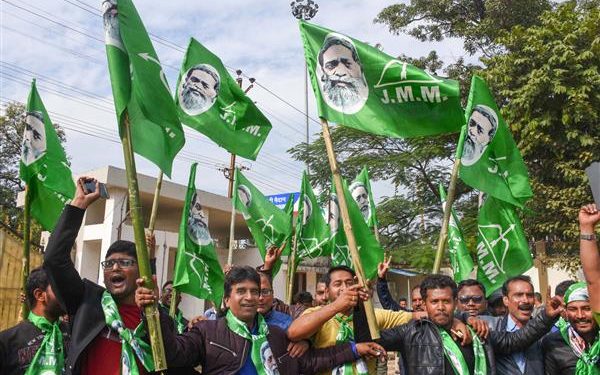Significantly, the BJP lost power and tasted defeat in one more state that went to Assembly polls. Jharkhand saw an anti-Modi verdict as results were out on Monday. The Jharkhand Mukti Morcha (JMM) and its allies, the Congress and the Rashtriya Janata Dal (RJD) together, won the mandate to rule the state for next five years. This follows a similar experience for the BJP in Maharashtra and a failure for it to win majority in Haryana too – the states that went to polls after the massive victory of the BJP in the Hindi belt in the 2019 Lok Sabha polls.
Assembly elections are mostly about stock-taking vis-à-vis the state’s issues and performance of rival political formations. At the same time, a host of BJP leaders, including PM Modi and Amit Shah, campaigning feverishly in Jharkhand this time by highlighting major steps the Centre was taking vis-à-vis Kashmir, the NRC and the CAA proved the defeat was not just localized. News reports say while top BJP leaders visited twenty-one times solely for campaigning, the JMM did so only with local leadership. This also meant that the BJP had little to highlight about the performance of the government about overall development of the state and also the nation. The last BJP government under the chief ministership of Raghubar Das in the state might be labeled now as a failure. A senior leader broke ranks and pitted himself against the CM in the election fray in Jharkhand East constituency, after he trashed the performance of the Raghubar Das government. In other words, the central BJP leadership, including the PM, failed to pay proper attention to the state in the past five years. To his discredit, perhaps, Das managed to lose with well over 9,000 votes margin, a real humiliation of a sitting head of the state.
The BJP has lost several seats it held last time. The JMM has raised its seat tally in a major way, becoming the largest single party and eating into the BJP bastions. The Congress party managed to retain its Assembly strength of 14, but could not make fresh gains and would play the role of the third force, just as it was assigned the fourth slot in Maharashtra.
The next in line will be the Delhi Assembly polls. The BJP, faced with ignominy in all the three Assembly polls in a row after the LS polls, will not have an easy go there too, for the reason that the AAP and Arvind Kejriwal retain considerable popularity and clout even after five years of rule. All of which go to show the BJP has little for cheer after its massive, unexpected LS win; that too by using extraneous factors or gimmicks like Balakot. Neither the state units of the party nor the governments the party runs are rising to the people’s expectations. While the Congress is failing to revive or revitalize, regional parties are reaping the benefits of the BJP’s steadily eroding base and fading image.
It is logical to suspect that the ill effects of governance both at state and central levels are bearing down heavy on the BJP’s political future. The party hardly has any leaders left with mass appeal. General feeling is that under Modi and Shah no leadership is sprouting as the duo wants to corner everything to themselves. In other words, the BJP and its anti-people policies are now hitting back. The immense money power that the party was supposedly using to win elections does not seem to yield results any longer. Also, the process of selection of CMs in BJP-ruled states in the last five years was itself a pointer to a phenomenon of faceless men coming upfront or leading governments. This is bound to have long-term adverse impacts on the political future of the BJP.
The BJP managed to hold on this far simply due to the failure of the Congress party – the principal Opposition – to act in an energetic manner. Nothing goes to show the Congress can revive from its present plight. But regional outfits are becoming the answer. For India, it is unwise to leave the stirrups of governance in the hands of people incapable of having a macro view of this vast nation. People had thought Modi and his followers were genuinely interested in development of the nation and benefits to the poor. His slogan of ‘Vikaas’ had built that confidence. Slowly but certainly that faith is waning. This is visible from the recent election outcomes.
Modi’s thoughts on ‘One Nation One Election’ were aimed at avoiding these middle-of-nowhere progress report cards. He wanted all elections at one go so that the interim period would be one single ghoulish time for the nation. Fortunately for India, he has been unable to implement this devilish plan. That is the reason why not only Modi and the BJP but also the common Indian is able to gauge the national sentiment now. It is also evident that while people might have fallen for Balakot once, they did not swallow Neelam Valley. This too should be an indication for the present lot in power that true development and trying to fool the nation all the time are two very different things. While divisiveness might pull chariot for some time, it will also, eventually, pull the rug from under their feet later.







































